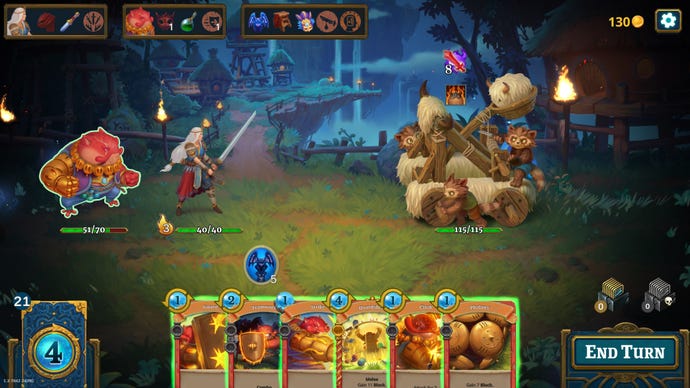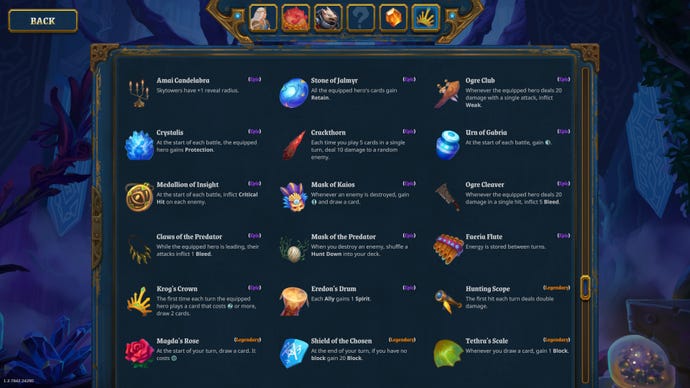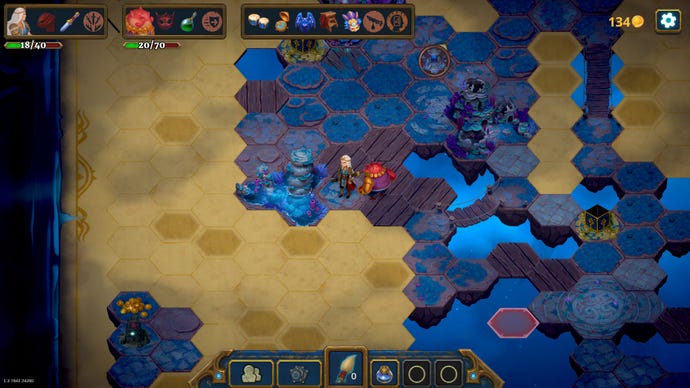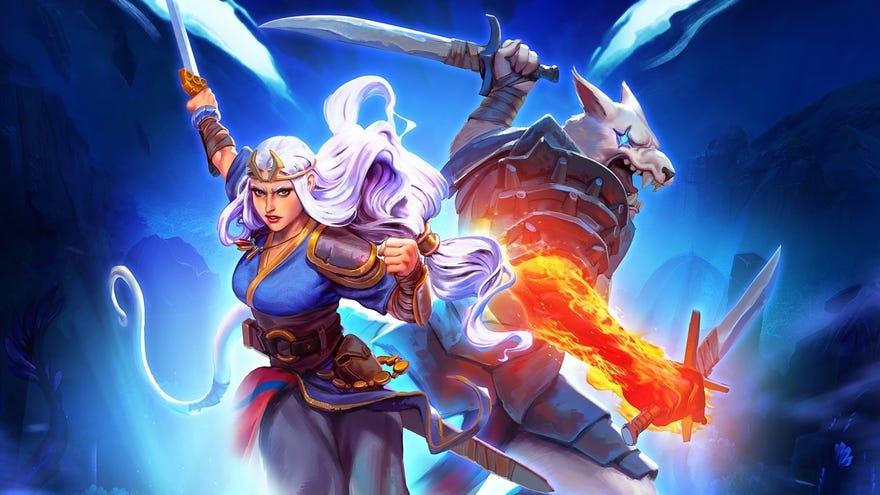Roguebook might just become your new favourite deckbuilder
Battle: toads
There's a good chance that if you're aware of Roguebook, the roguelike deckbuilder designed by Richard Garfield of Magic: The Gathering fame, it'll be because it launched under a bit of a cloud. The launch build was a buggy business, and it was accompanied by premium DLC on day one, which got people good and riled up. Honourably enough, developers Abrakam almost immediately folded the DLC into the base game and started spamming refunds. But by then, a lot of folks had already moved on.
That's a real shame, in my opinion. Because Roguebook is great. I know this, because in the three days I have spent with it, I have not touched Hearthstone once. I have had neither the desire, nor the compulsion which usually subs in for it, to even get so far as opening the launcher. And when a card game gets me to the extent where I'll tear that IV drop of poisoned ambrosia from my veins, I know it's the real deal.
It is easiest to describe games like Roguebook by comparing them to Slay The Spire. You progress across a map via a series of encounters, in which you play a card game against monsters who bob up and down on their knees like excitable toddlers. If you win the fights, you get to add cards to your deck, or improve the ones you've already got. If you lose you have to start again, albeit with some new perks to boost your chances, and some new aspects of the world unlocked. You almost certainly know the drill.
Again, as with most deckbuilders of this ilk, Roguebook is set in a fantasy world. It shares a setting with 2017's Faeria (a digital CCG which was also developed by Abrakam, and which was also mostly overlooked despite being a solid card game), and while it's extremely light on narrative, I gather the setting involves quite a lot of frogs. That's a good thing, I reckon.

It's beautiful to look at, too. And while that might seem irrelevant in a subgenre of products that feel more like drugs than games - as if you'd rate disco biscuits according to how uncannily Donald Duck had been printed on each tabs - I'm surprised how much it mattered. Games like Roguebook, after all, are games you play over and over again. And if you've ever been stuck in a lift, you'll know how important small details become, once you reach a certain level of familiarity.
The point at which Slay The Spire tipped over my mental break-even point from "must play again" to "don't really feel like it" took a long time coming. But it might have been postponed, at least a little, if I hadn't found its weird, slightly MS-Painty aesthetic so bleak and pared-down. You might feel totally differently, of course. But I suspect that for me, Roguebook's good looks will pay dividends.

What about the design, though? Well, Richard Garfield sure can put together a card game. It would be meaningless to describe the ruleset to you, and it wouldn't be hugely surprising to anyone who's played Slay The Spire, Monster Train and company. The TL;DR is that Roguebook has rules simple enough to pick up by your second or third encounter (with barely any tutorial), but with enough emergent complexity that you'll find yourself still learning new tricks after eighteen hours of play. Easy to learn, hard to master, and so on.
There are two big factors which set Roguebook out as a winner for me. The first is that, on each run, you control a duo of heroes chosen from a roster of four. Each has their own library of cards, reminiscent of the tribal system from Monster Train, but with way more emphasis on the way you blend the flavours during play. Some cards get cheaper after you play another hero's, for example, while others offer benefits if they're played from a hand comprising only their stablemates. There's a little bit of Darkest Dungeon to it, at times.
Proper success in the game comes about as a result of working out how to build synergies between the different sets (like in Magic, innit), and doing so requires a surprising amount of lateral thought. It helps that the four characters on offer aren't entirely shoehorned into archetypes, either. While they've definitely got defined roles - your tortoise lady does healing and card draw, your big frog bloke is a tank with loads of area-of-effect abilities - they've each got a wide array of more subtle specialties, whose full power you only realise once you experiment with them.

The other big differentiator for Roguebook, and my personal favourite, is the exploration layer. Rather than Slay The Spire's bastard-haunted flowchart of a map, here you're presented with a hex-based world obscured by a fog of war, which reminded me weirdly of both the Heroes Of Might & Magic games, and Minesweeper. The former because the map's hexes conceal fights, resources and treasures to pick up, and the latter because you're trying to work out how to reveal it all as efficiently as possible.
As in most roguelikes, the more fights you can have before reaching a boss, and the more loot you can find, the higher your chances of progression. Roguebook is fair to you in this regard: every single chapter map, no matter how it generates, will hold everything you need to sail through its final boss with ease. The trick is in getting it all uncovered.
"Very rarely did I feel I'd been handed a properly unwinnable turd of a map."
You start each map with a limited number of tools for revealing hexes, and the only way to get more is... that's right. Clearing hexes. It's a puzzle game all in itself, and one I found genuinely even more rewarding than the actual fights. The satisfaction of chaining several reveals after an unpromising start made me feel like Sir Brainsalot every single time, and very rarely did I feel I'd been handed a properly unwinnable turd of a map by the RNG.
That sense of never feeling truly fucked over by the game is one which is vanishingly rare in the world of roguelikes. Nevertheless, Roguebook pulls it off without actually being that easy. True, there are certain strategies and combos which are a bit busted, and there are cards which I'm beginning to consider as autopicks every time I see them. But given the speed with which Abrakam fixed their launch DLC issue, I've got high hopes of them being just as responsive with balancing issues.
So, as uncomplicated a verdict as it might be, I urge you to get stuck in. Obviously, this is a much younger game than Slay The Spire, so don't expect anything like as many hours out of it at this point. But if it gets the pickup it deserves, as well as some less fraught DLC later down the line, I'm really excited to see what it will become.


